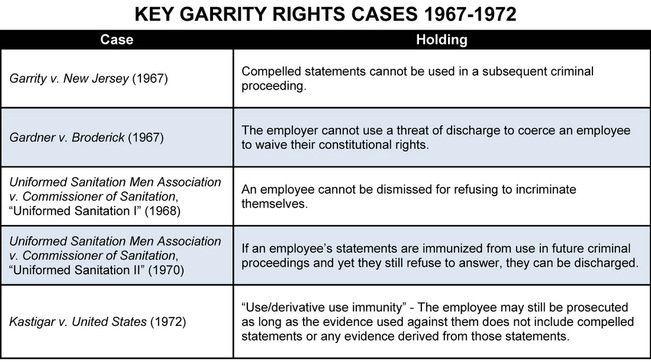|
GARRITY RIGHTS
Garrity Rights protect public employees from being compelled to incriminate themselves during investigatory interviews conducted by their employers. This protection stems from the Fifth Amendment to the United States Constitution, which declares that the government cannot compel a person to be a witness against him/herself.
For a public employee, the employer is the government itself. When questioned by their employer, they are being questioned by the government. Therefore, the Fifth Amendment applies to that interrogation if it is related to potentially criminal conduct.
Garrity Rights stem not just from the Fifth Amendment, but also the Fourteenth Amendment. While the Fifth Amendment could be said to apply only to the federal government, the "equal protection" clause of the Fourteenth Amendment makes the Fifth Amendment applicable to state, county, and municipal governments as well (determined by the United States Supreme Court in 1964's Malloy v. Hogan)
Garrity Rights originate from a 1967 United States Supreme Court decision, Garrity v. New Jersey.
The Garrity Story
In 1961, the New Jersey attorney general began investigating allegations that traffic tickets were being “fixed” in the townships of Bellmawr and Barrington. The investigation focused on Bellmawr police chief Edward Garrity and five other employees. When questioned, each was warned that anything they said might be used against them in a criminal proceeding, and that they could refuse to answer questions in order to avoid self-incrimination. However, they were also told that if they refused to answer, they would be terminated. Rather than lose their jobs, they answered the investigators’ questions. Their statements were then used in their prosecutions – over their objections – and they were convicted.
The U.S. Supreme Court then ruled in 1967’s Garrity v. New Jersey that the employees’ statements, made under threat of termination, were compelled by the state in violation of the Fifth and Fourteenth Amendments. The decision asserted that “the option to lose their means of livelihood or pay the penalty of self-incrimination is the antithesis of free choice to speak or to remain silent.” Therefore, because the employees’ statements were compelled, it was unconstitutional to use the statements in a prosecution. Their convictions were overturned.
 This was copied directly from http://www.garrityrights.org/basics.html
Stay Safe
Ft Pitt Lodge #1 FOP VP (2018)
|
